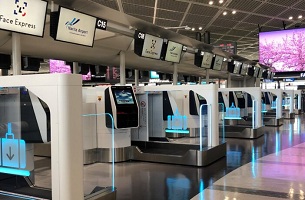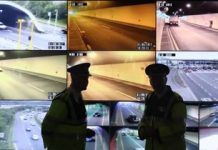Amadeus and NEC Corporation, in partnership with Narita International Airport Corporation (NAA), are conducting a major rollout of biometric technology at Narita International Airport that will allow passengers to complete every step in the airport journey simply by presenting their faces to cameras.
With effect from April 13, passengers check-in at one of several new biometric kiosks where their facial images will be captured and verified against their passports. Once the verification process is done, they are able to drop their luggage at an auto bag drop (ABD) unit, which will use a camera to automatically recognize passengers as they approach it.
Passengers will also be able to pass through security and boarding using just their faces thanks to Narita’s security e-gates and boarding e-gates, both equipped with cameras that automatically validate the passenger’s identity and permission to fly. The new biometric process uses the IATA One ID standard. Following successful trials, it will be adopted as the new standard for all international departures at the airport.
Masato Kitagawa, manager of the mechanical systems engineering department at NAA, said, “Everyone at Narita Airport is proud to have delivered Japan’s first end-to-end biometric departure process. Our passengers will benefit from a low-touch, automated experience that increases safety and convenience. Biometric technology is an incredibly powerful tool and key in addressing the challenges posed by Covid-19.”
ICM Airport Technics, an Amadeus Company, supplied the kiosks and ABD units fitted with biometric cameras and application software. Richard Dinkelmann, the company’s CEO, added, “This has been an extremely rewarding project that sees NEC’s facial recognition software deployed on Amadeus’s market-leading hardware for the first time. We’ve worked very closely together in order to create a contactless boarding process and to deliver on the requirements of both Narita International Airport Corporation and the Japanese government.”
The new service contributes to Narita Airport’s Covid-19 response by removing the need for passengers to have interpersonal interactions, while virtually eliminating the need to touch self-service hardware. The solution also reduces the time it takes to pass through each airport checkpoint, helping Narita Airport meet its social distancing objectives. Narita served approximately 45 million passengers in 2019 and is a major hub for airlines including Japan Airlines and All Nippon Airways.







